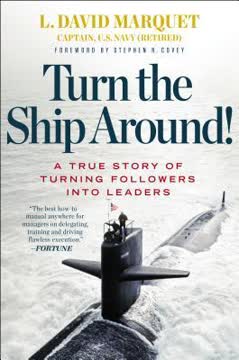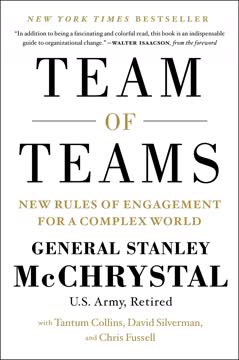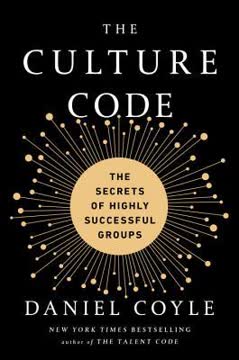Key Takeaways
1. The Infinite Game: A New Perspective on Business and Life
In the Infinite Game, there is no such thing as winning or losing.
Finite vs. Infinite Games: In finite games, like football, there are known players, fixed rules, and a clear endpoint. Infinite games, like business or life, have known and unknown players, changeable rules, and no defined endpoint. The goal is not to win, but to keep playing.
Shifting Mindset: Adopting an infinite mindset means:
- Focusing on long-term sustainability rather than short-term wins
- Building resilient organizations that can adapt to change
- Prioritizing the well-being of all stakeholders, not just shareholders
Leaders with an infinite mindset understand that success is not about beating competitors, but about continually improving and advancing a greater cause. This perspective fosters innovation, collaboration, and ethical decision-making, ultimately leading to more sustainable and fulfilling business practices.
2. Just Cause: The Foundation of Infinite Thinking
A Just Cause is a specific vision of a future state that does not yet exist; a future state so appealing that people are willing to make sacrifices in order to help advance toward that vision.
Characteristics of a Just Cause:
- For something - affirmative and optimistic
- Inclusive - open to all who wish to contribute
- Service-oriented - for the primary benefit of others
- Resilient - able to endure political, technological, and cultural change
- Idealistic - big, bold, and ultimately unachievable
A Just Cause goes beyond profit-making; it's a compelling vision that inspires people to contribute their best efforts. It provides direction and meaning in the face of challenges and changes. Companies with a clear Just Cause, like Patagonia's commitment to environmental sustainability, tend to attract more loyal employees and customers, and are better equipped to navigate long-term challenges.
3. Ethical Leadership: Building Trust and Integrity
Trust is a feeling. Just as it is impossible for a leader to demand that we be happy or inspired, a leader cannot order us to trust them or each other.
Fostering Trust: Leaders must create an environment where:
- People feel psychologically safe to express vulnerability
- Mistakes are seen as opportunities for learning, not punishment
- Open communication is encouraged and valued
Ethical Decision-Making: Leaders must:
- Prioritize long-term sustainability over short-term gains
- Consider the impact of decisions on all stakeholders
- Act with integrity, even when it's costly or unpopular
Building a culture of trust and ethical behavior is crucial for long-term success. Companies like CVS, which stopped selling tobacco products despite the short-term financial hit, demonstrate how ethical leadership can lead to stronger customer loyalty and employee engagement. This approach also helps prevent ethical fading, where unethical behavior becomes normalized over time.
4. The Dangers of Finite Thinking in Business
Finite-minded companies might worry that this kind of approach may cost too much, hurt profits, lose customers or ruin their reputation.
Short-Term Focus: Finite thinking often leads to:
- Prioritizing quarterly earnings over long-term sustainability
- Unethical practices to meet arbitrary targets
- Neglecting employee well-being and customer satisfaction
Consequences: This mindset can result in:
- Loss of trust from employees and customers
- Increased vulnerability to market changes and competition
- Ethical scandals and reputational damage
Companies like Kodak, which failed to adapt to digital photography despite inventing it, illustrate the dangers of finite thinking. By prioritizing their existing business model over innovation and long-term viability, they ultimately became obsolete. In contrast, companies that embrace an infinite mindset, like Amazon's continuous innovation, are better positioned to adapt and thrive in changing markets.
5. Worthy Rivals: Embracing Competition for Growth
A Worthy Rival is another player in the game worthy of comparison.
Shifting Perspective: Instead of viewing competitors as enemies to be defeated, see them as:
- Sources of inspiration and learning
- Catalysts for improvement and innovation
- Partners in advancing the industry or cause
Benefits: Embracing Worthy Rivals can:
- Push organizations to constantly improve
- Provide benchmarks for progress
- Help clarify and strengthen an organization's unique value proposition
Apple's relationship with IBM in the early days of personal computing exemplifies this concept. By positioning IBM as a symbol of the status quo, Apple clarified its own identity as an innovator and champion of individual empowerment. This rivalry pushed both companies to innovate and ultimately benefited the entire industry.
6. Existential Flexibility: Adapting for Long-Term Success
Existential Flexibility is the capacity to initiate an extreme disruption to a business model or strategic course in order to more effectively advance a Just Cause.
Characteristics:
- Willingness to abandon successful strategies for future potential
- Openness to radical changes in business model or direction
- Driven by advancement of the Just Cause, not short-term gains
Examples:
- Disney's pivot from animation to theme parks
- Netflix's transition from DVD rentals to streaming
Existential flexibility requires courage and a clear sense of purpose. It's not about chasing trends, but about making bold moves to better serve the organization's Just Cause. Leaders must be willing to risk short-term stability for long-term relevance and impact. This approach allows companies to stay ahead of market changes and continue to thrive in evolving landscapes.
7. Courage to Lead: Making Tough Decisions for the Greater Good
The Courage to Lead is a willingness to take risks for the good of an unknown future.
Characteristics of Courageous Leadership:
- Prioritizing long-term value over short-term gains
- Making ethical decisions, even when costly
- Challenging industry norms and expectations
Examples:
- CVS stopping tobacco sales, risking $2 billion in annual revenue
- Patagonia's "Don't Buy This Jacket" campaign, promoting sustainability over sales
Courageous leadership often means making decisions that may be unpopular with short-term focused stakeholders but align with the organization's values and long-term vision. It requires a strong commitment to the Just Cause and the ability to inspire others to embrace an infinite mindset. Leaders who demonstrate this courage often build stronger, more resilient organizations that are better equipped to navigate challenges and create lasting value.
Last updated:
FAQ
What's The Infinite Game by Simon Sinek about?
- Core Concept: The book contrasts finite games, with clear winners and losers, against infinite games, which focus on long-term sustainability and purpose.
- Infinite Mindset: Sinek argues that businesses should adopt an infinite mindset to thrive in a constantly changing environment.
- Leadership and Purpose: It emphasizes the importance of leaders adopting an infinite mindset, focusing on a Just Cause that inspires and motivates employees.
Why should I read The Infinite Game by Simon Sinek?
- Relevance to Modern Business: Understanding infinite thinking can help organizations thrive in a rapidly changing business environment.
- Inspiration for Leaders: The book encourages leaders to think beyond immediate profits and consider the long-term impact of their decisions.
- Practical Framework: It offers a framework for leaders to implement an infinite mindset, including the importance of trust, collaboration, and a clear Just Cause.
What are the key takeaways of The Infinite Game by Simon Sinek?
- Adopt an Infinite Mindset: Focus on long-term goals and the greater good rather than short-term wins.
- Importance of a Just Cause: A Just Cause is a vision of a future state that inspires people to make sacrifices for a greater purpose.
- Build Trusting Teams: Trust is essential for high-performing teams, and leaders must create environments where team members feel safe.
What is a Just Cause in The Infinite Game by Simon Sinek?
- Definition: A Just Cause is a purpose that inspires and motivates individuals and organizations to strive for something greater than themselves.
- Characteristics: It should be resilient, inclusive, and service-oriented, resonating with employees and stakeholders.
- Impact: Organizations with a clear Just Cause are more likely to attract loyal customers and dedicated employees.
How does The Infinite Game by Simon Sinek define leadership?
- Infinite-Minded Leadership: Effective leaders focus on long-term success and the well-being of their teams, prioritizing people over profits.
- Role of the Chief Vision Officer: Leaders should see themselves as Chief Vision Officers, responsible for communicating and protecting the organization's Just Cause.
- Building a Circle of Safety: Leaders must create a safe environment where team members feel valued and can express themselves without fear.
What are the best quotes from The Infinite Game by Simon Sinek and what do they mean?
- "The primary objective is to keep playing, to perpetuate the game.": Emphasizes that the goal is not to win but to continue the journey and make a lasting impact.
- "Leaders are not responsible for the results. Leaders are responsible for the people who are responsible for the results.": Highlights the role of leaders in nurturing their teams and creating an environment that fosters success.
- "Trust is built when we do the right thing, especially when we aren’t forced to.": Stresses the importance of integrity in leadership and acting ethically.
How can organizations implement the principles from The Infinite Game by Simon Sinek?
- Shift Mindset: Encourage leaders and employees to adopt an infinite mindset, focusing on long-term goals and the greater good.
- Define and Communicate a Just Cause: Articulate the Just Cause clearly and ensure it resonates with all employees.
- Foster a Culture of Trust: Prioritize building trusting teams by creating safe environments for open communication and vulnerability.
What role do Worthy Rivals play in The Infinite Game by Simon Sinek?
- Definition: Worthy Rivals are competitors who challenge us to improve and grow rather than simply defeat us.
- Learning from Rivals: Viewing competitors as Worthy Rivals allows organizations to learn from their strengths and weaknesses.
- Shifting Mindset: This perspective fosters a culture of continuous improvement and collaboration rather than adversarial relationships.
How does The Infinite Game by Simon Sinek address the concept of trust?
- Trust as a Foundation: Trust is essential for high-performing teams and is built through vulnerability and open communication.
- Trusting Teams vs. Working Groups: Trusting teams are characterized by strong relationships and a shared commitment to the organization's Just Cause.
- Impact on Performance: Organizations with high levels of trust tend to perform better, leading to improved outcomes and a healthier work culture.
What is the significance of Existential Flexibility in The Infinite Game by Simon Sinek?
- Definition: Existential Flexibility is the ability to make significant changes to a business model or strategy to better advance a Just Cause.
- Importance for Leaders: Leaders must be willing to disrupt their own successful paths if it will better serve their organization's purpose.
- Examples: Sinek provides examples of companies and leaders who have successfully made Existential Flexes, leading to renewed growth and innovation.
How does The Infinite Game by Simon Sinek address the concept of courage in leadership?
- Courage to Challenge Norms: Courageous leaders are willing to challenge established norms and make decisions that may be unpopular.
- Long-Term Vision: Leaders must prioritize long-term goals over short-term gains, even if it means facing backlash.
- Building Trust Through Courage: When leaders act courageously, they inspire their teams, strengthening the organization's culture and commitment to its mission.
What are the consequences of a finite mindset in business according to The Infinite Game by Simon Sinek?
- Short-Term Focus: A finite mindset leads organizations to prioritize immediate results over long-term sustainability.
- Decline in Trust and Innovation: This mindset often results in a decline in trust and collaboration, stifling innovation.
- Increased Turnover and Burnout: Employees may feel undervalued, leading to high turnover rates and burnout, harming the organization's performance.
Review Summary
The Infinite Game receives mixed reviews. Many praise its thought-provoking ideas about long-term business perspectives and leadership, finding it inspirational and valuable. Critics argue the concept could have been presented more concisely. Readers appreciate Sinek's emphasis on ethical practices and human-centered leadership. Some find the examples repetitive or cherry-picked. The book's core message of adopting an "infinite mindset" in business and life resonates with many, though some question its universal applicability. Overall, it's seen as a worthwhile read, especially for leaders and business enthusiasts.
Similar Books










Download PDF
Download EPUB
.epub digital book format is ideal for reading ebooks on phones, tablets, and e-readers.







